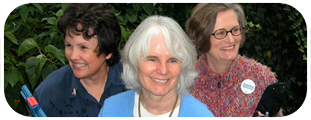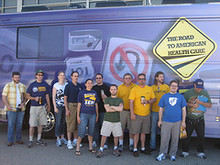 Years ago I remember being in a Bed & Breakfast in north Indiana, on a work trip. It was an election night, 1998 I believe. I was reading a book by a western Buddhist teacher, maybe Pema Chodron, maybe Suzuki Roshi. In the background, I was paying attention to the election results across the country. I had to laugh. The little bit I'd figured out about Buddhism by that time told me that one of the "goals" was to be less identified with the exterior definitions of who I was - a passionate Democrat, among other things - and to be less attached to the outcome.
Years ago I remember being in a Bed & Breakfast in north Indiana, on a work trip. It was an election night, 1998 I believe. I was reading a book by a western Buddhist teacher, maybe Pema Chodron, maybe Suzuki Roshi. In the background, I was paying attention to the election results across the country. I had to laugh. The little bit I'd figured out about Buddhism by that time told me that one of the "goals" was to be less identified with the exterior definitions of who I was - a passionate Democrat, among other things - and to be less attached to the outcome.And while I was reading, I was watching TV, waiting with bated breathe to see how people were voting on Senate and Congressional Gubernatorial candidates around the country.
So, I've had these two mostly disconnected parts of my life for the last decade or more: both have been quite important to me and there has not been a lot of overlap.
Last weekend I was with 500-600 people in a large convention hall in Shoreline listening to my teacher. Adyashanti became my teacher the second time I listened to him. He regularly gave satsangs in the Bay Area where I lived up until 5 years ago. These were talks, followed by dialogues with people who had questions for him. What he said came into my body in many ways beyond what I got with my head. I'd never felt that before quite in that way. I'd never had a teacher, I mean since grad school, and I never expected to have one even though I'd listened to some wonderful ones. After that, I got to go to many of Adya's satsangs and intensives and retreats up until I moved back to Washington. Then I'd gone for the first few years once or twice a year for 5-day silent retreats. I hadn't been in his presence for two years or so.
Here's one of many videos of Adya on YouTube.
Last weekend I heard him talk for the first time at length about what I would call the political world. Adya doesn't say "politics", he talks about naturally being compassionate for people who are homeless and wanting to do something about it. Or he says "out there", past our couches.
On Friday evening, an audience questioner, Larry, felt that "New Age" for many people meant that they could sit back and not do much for the world because "all was well", "it's Karma", and such. Given how important it is to make some changes in the world very quickly, Larry questioned the very idea of sitting on your hands and implied that teachers, Adya included, needed to encourage that. Larry was persistent. He asked a related question then next day as well.
This was wildly interesting to me since this was the one area that I hadn't heard Adya address much. Adya is a totally unpretentious guy who happens to be enlightened and wants to help the rest of us become enlightened. He talks and writes about the process of allowing ourselves to find that "emptiness" and to allow our actions to emerge from a place that was less "ego", more in touch with ourselves and the larger universe. In his teaching, he works with people and their questions after he has talked about his initial 20-30 minute talk. I have had occasion to have many counselors and therapists in my life, both in the past as a client and often as friends. I love them dearly but I've met only one therapist who could hold a candle to Adya. And, unlike Adya, that person wasn't in the business of connecting it with thoughts on how we could get in touch with the great presence or a haiku by Dogen.
And he's funny. I've often said that Adya could go toe-to-toe against Leno and Letterman and come out even. It's just that what we're laughing about is so often about our foibles or our yearnings or the stories we tell ourselves rather than the Top Ten things some celebrity did.
But Adya's responses to questions of what to do about the starving children in Africa or the coming global warming era had always, in my mind, been the one area where he fell short. I did hear and understand that it doesn't make sense to act out of anger, to bring our own resentment of how we were treated as children for example, into the political or cause-oriented world. Anger just doesn't appeal much to people; it doesn't contribute a lot to what we think we are trying to do.
His answer to Larry's question was that yes, of course, when we see suffering we are going to want to respond. He talked again about making sure we were responding from a place of love and compassion and acceptance. He talked about accepting what was, not railing against what we can't change. But, in addition, this time he said over and over again how important it was to get out in the world and implement the changes we see should happen. Over the course of the next day, he brought it up in several ways. Adya said (and I wasn't taking notes so this relies on my memory) that we wanted to gain enlightment when we could, not wait until everyone else could also be enlightened but then we would also want to bring the other 6 billion along as well. So, getting out in the world and doing that which our hearts called out to us to do in the world was just right. We weren't about sitting around on our asses.
At another time, Adja talked about the huge shift he'd seen happening in these last few years - going from a place where we'd been quite stuck for a long while. Then, in the last year or two, making a large shift in what we wanted and making it happen. People were conceiving of a new way of being. (Of course, Adya isn't in the business of talking specifically about politicians by name.) He went on. Once we have a clarity about what we want to see happen, action will happen quite quickly.
I so appreciated Adya's thoughts on this. I could see how important that is for us individually but also collectively. Once we find a clarity of purpose together, we will be able to make change.
I went to find another video of Adya to show here and found a stash of videos of him talking in 2005 about very much what he was saying this last weekend. So, he has been talking about it, more integrating of "political" and spiritual", in other settings or interviews, not so much until lately in his regular teachings and Q&A.


